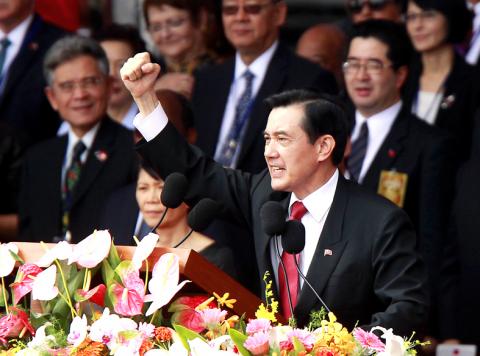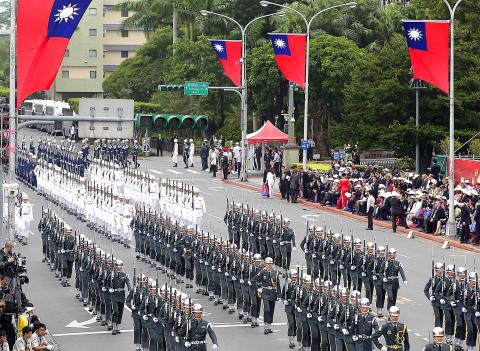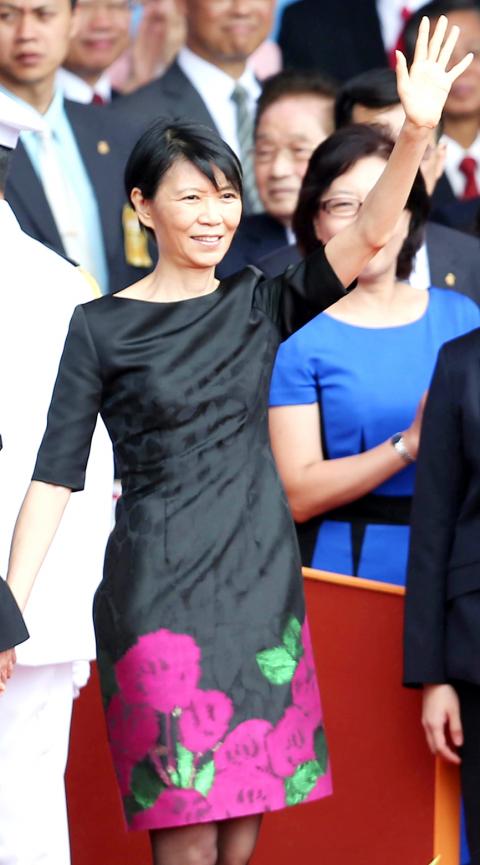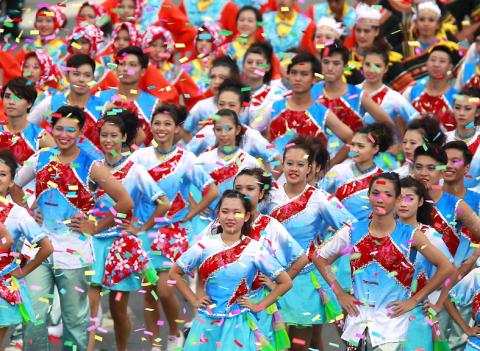President Ma Ying-jeou (馬英九) criticized the social movements the nation has seen in recent years during yesterday’s Double Ten National Day speech, labeling them obstructionist groups that hindered the economy and engaged in “undemocratic” behavior.
To mark the 103rd anniversary of the founding of the Republic of China (ROC), Ma delivered a speech titled “Proud of Our Democracy, Proud of Taiwan” at a Taipei ceremony, which was attended by more than 400 foreign dignitaries, including Burkinabe President Blaise Compaore and Paraguayan President Horacio Cartes.
Much of the speech was devoted to how the adoption of a constitutional democracy has built today’s Taiwan, a feat Ma said would “serve as a guidepost for ethnic Chinese societies,” despite the challenges the nation has faced in its democratic development in recent years.

Photo: Reuters
“In the last year or two, protesters have resorted to some extremely zealous and illegal actions that ignored the lawful interests of people with different opinions,” Ma said. “In some cases, they went so far as to occupy government buildings.”
The latter part of Ma’s comments were an apparent reference to the student-led Sunflower movement, which occupied the main chamber of the legislature in March and April to protest the government’s handling of the cross-strait service trade agreement.
“Such undemocratic behavior has generated needless conflict, and allowed a minority to prevent legislative deliberations on many pending bills,” Ma said.

Photo: Reuters
While countries are pressing to establish economic and trade alliances, and take part in regional economic integration, Taiwan has remained at a standstill on this front, Ma added.
Ma said that a number of policies must be pursued to increase the nation’s economic integration with other countries, including proposals to restructure industries and make more value-added products, carry out deregulation and open up markets, “[and these] cannot be debated rationally” with such protests.
“What we have encountered ... is pure obstructionism that has made progress impossible,” Ma said. “If those who oppose our policies refuse to engage in discussion and are unable to propose any alternative, then they are not acting in the spirit of democracy, and Taiwan can only watch helplessly as its competitive advantages slip away.”

Photo: CNA
Ma urged the opposition camp to return to democratic constitutionalism.
“Let us all stay within the system and communicate with sincerity,” he said, adding that his administration is “quite willing to uphold democracy by talking with people from all walks of life in a spirit of complete candor.”
Ma also said that China should move toward constitutional democracy and honor pledges it made to Hong Kong when the territory was returned to China in 1997 that for 50 years it would allow “rule of Hong Kong by the people of Hong Kong,” “a high degree of autonomy” and “election of the chief executive through universal suffrage.”

Photo: Reuters
Ma said Beijing should take note that “now is the most appropriate time to move towards constitutional democracy” because China is experiencing rapid economic growth and its people lead affluent lives.

AIR SUPPORT: The Ministry of National Defense thanked the US for the delivery, adding that it was an indicator of the White House’s commitment to the Taiwan Relations Act Deputy Minister of National Defense Po Horng-huei (柏鴻輝) and Representative to the US Alexander Yui on Friday attended a delivery ceremony for the first of Taiwan’s long-awaited 66 F-16C/D Block 70 jets at a Lockheed Martin Corp factory in Greenville, South Carolina. “We are so proud to be the global home of the F-16 and to support Taiwan’s air defense capabilities,” US Representative William Timmons wrote on X, alongside a photograph of Taiwanese and US officials at the event. The F-16C/D Block 70 jets Taiwan ordered have the same capabilities as aircraft that had been upgraded to F-16Vs. The batch of Lockheed Martin

US President Donald Trump yesterday announced sweeping "reciprocal tariffs" on US trading partners, including a 32 percent tax on goods from Taiwan that is set to take effect on Wednesday. At a Rose Garden event, Trump declared a 10 percent baseline tax on imports from all countries, with the White House saying it would take effect on Saturday. Countries with larger trade surpluses with the US would face higher duties beginning on Wednesday, including Taiwan (32 percent), China (34 percent), Japan (24 percent), South Korea (25 percent), Vietnam (46 percent) and Thailand (36 percent). Canada and Mexico, the two largest US trading

GRIDLOCK: The National Fire Agency’s Special Search and Rescue team is on standby to travel to the countries to help out with the rescue effort A powerful earthquake rocked Myanmar and neighboring Thailand yesterday, killing at least three people in Bangkok and burying dozens when a high-rise building under construction collapsed. Footage shared on social media from Myanmar’s second-largest city showed widespread destruction, raising fears that many were trapped under the rubble or killed. The magnitude 7.7 earthquake, with an epicenter near Mandalay in Myanmar, struck at midday and was followed by a strong magnitude 6.4 aftershock. The extent of death, injury and destruction — especially in Myanmar, which is embroiled in a civil war and where information is tightly controlled at the best of times —

China's military today said it began joint army, navy and rocket force exercises around Taiwan to "serve as a stern warning and powerful deterrent against Taiwanese independence," calling President William Lai (賴清德) a "parasite." The exercises come after Lai called Beijing a "foreign hostile force" last month. More than 10 Chinese military ships approached close to Taiwan's 24 nautical mile (44.4km) contiguous zone this morning and Taiwan sent its own warships to respond, two senior Taiwanese officials said. Taiwan has not yet detected any live fire by the Chinese military so far, one of the officials said. The drills took place after US Secretary